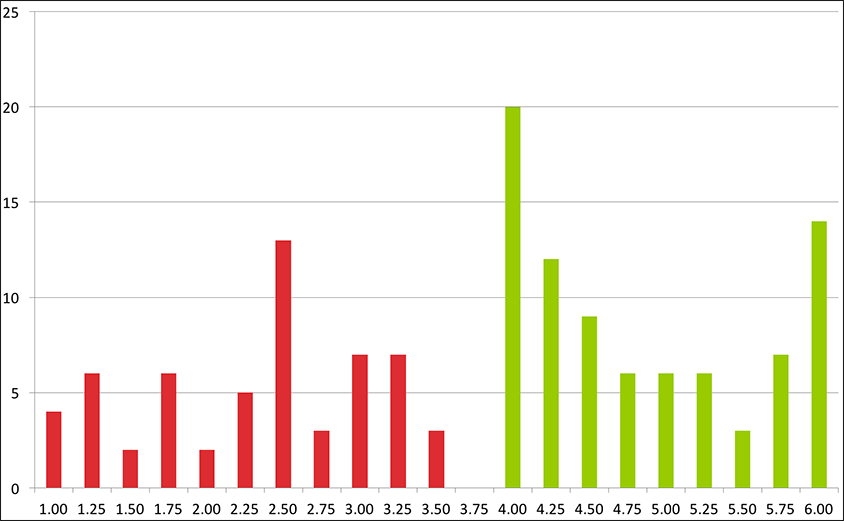Department of Computer Science | Institute of Theoretical Computer Science
Department of Computer Science | Institute of Theoretical Computer Science
Exam Statistics (Feb 24, 2017)

For questions on exercises use the forums on moodle. For administrative questions or for reporting technical problems (with moodle or the judge), use algolab@lists.inf.ethz.ch.
Prof. Angelika Steger, Prof. Emo Welzl, Prof. Peter Widmayer
Andreas Bärtschi, Daniel Graf, Dr. Michael Hoffmann, Frank Mousset, Antonis Thomas, Nemanja Škorić, Dr. Przemysław Uznański, Felix Weissenberger, Manuel Wettstein
Tutorials: Wednesday, 17-19, CAB G 61 (first tutorial: Sep 21, 2016)
Problem of the week: Monday, 17-19, CAB H 56, CAB H 57, HG E 26.1, or anywhere else (first PotW: Sep 26, 2016)
Consulting hours: Wednesday, 19-, CAB G 61 (after the tutorial)
see also: vvz.ethz.ch
The objective of this course is to learn how to solve a problem given by a textual description. This includes appropriate problem modeling, choice of suitable (combinatorial) algorithms, and implementing them using C/C++, STL, BGL, and CGAL.
In this course students learn how to solve algorithmic problems given by a textual, story-like description. We assume knowledge of elementary algorithms and data structures as they are typically taught on the Bachelor level. In tutorials we introduce more advanced algorithms and the usage of some standard libraries for combinatorial algorithms. Students practice their skills by solving weekly exercises. For that they have to understand the problem setting, find an appropriate modeling, choose suitable algorithms, and implement them using C/C++, STL, BGL, and CGAL. The evaluation of the correctness and efficiency of their solutions will be performed by an online-judge which compiles the submitted source-code and runs it on a set of test instances.
This course is a lab: Most of the time is spent working individually on the given problems.
In addition there is a weekly tutorial. These tutorials are not lectures in the classical sense. In particular we will not present theory and proofs there. Instead we rely on the corresponding knowledge gained during your Bachelor studies. The tutorials serve
Occasionally we will work with algorithms and data structures that the students may not have encountered during their Bachelor studies. Such algorithms and data structures will be properly introduced in the tutorials, with a focus on applications rather than on the underlying theory.
Every Wednesday after the tutorial we will hand out problem sets. The students hand in their solutions, using the online-judge, within one week.
Every Monday at 17:00 we post one problem as a "Problem of the Week". In order to score points for this problem, only solutions that are submitted within the following two hours are counted. The goal of this setup is to make students accustomed to exam conditions and provide an early feedback of where they stand.
Finally, the assistants will be available for consulting hours every Wednesday after the tutorial. These offer a place to ask questions and get help if you lack a necessary idea to solve a problem or if you struggle with any other kind of course related problem.
The grade of the course is solely based on the final exam. The exam takes place in a computer room, on two different days, 6 hours each, during the examination session. On both days you have to solve problems similar to those given during the semester.
Tutorial 1: Introduction to the working environment and the submission framework (online-judge) + Basics about how to program for this lab.
Tutorial 2: BFS/DFS graph traversals; general problem solving strategies: greedy and divide & conquer
Tutorial 3: Introduction to geometric computing in CGAL
Tutorial 4: Introduction to graph representations and algorithms in the BGL
Tutorial 5: Dynamic programming
Tutorial 6: Network flow algorithms in BGL
Tutorial 7: Linear and quadratic programming - Theory & the CGAL solver
Tutorial 8: Proximity structures in CGAL
Tutorial 9: Applications of network flows: matchings and cuts
Tutorial 10: How to solve problems and prepare for the exam, discussion of sample solutions
Tutorial 11-13: 3-fold problem sets (three similar but different problems to solve during the tutorial)
Tutorial 14: Q&A session
Daniel Graf has compiled some information about the setup in the ETH student computer labs and instructions on how to setup the necessary software on your own computer.
Here is a virtualbox image that contains everything preinstalled.
T. Cormen, C. Leiserson, R. Rivest: Introduction to Algorithms, MIT Press, 1990.
J. Hromkovic, Teubner: Theoretische Informatik, Springer, 2004 (English: Theoretical Computer Science, Springer 2003).
J. Kleinberg, É. Tardos: Algorithm Design, Addison Wesley, 2006.
H. R. Lewis, C. H. Papadimotriou: Elements of the Theory of Computation, Prentice Hall, 1998.
T. Ottmann, P. Widmayer: Algorithmen und Datenstrukturen, Spektrum, 2002.
R. Sedgewick: Algorithms in C++: Graph Algorithms, Addison-Wesley, 2001.